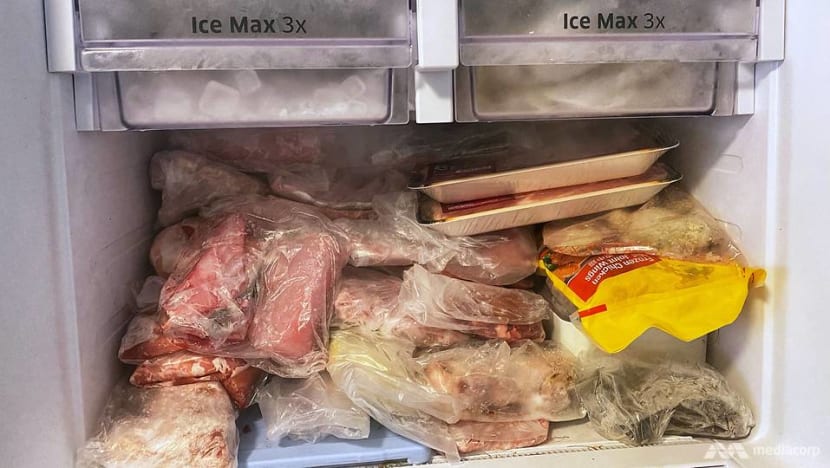Demand for frozen food, freezers spikes amid COVID-19 pandemic

File photo of frozen food.
SINGAPORE: With Singaporeans staying at home as much as possible amid the COVID-19 pandemic, supermarkets here are seeing a spike in demand for frozen food.
Since the onset of COVID-19, NTUC FairPrice has seen increased demand for frozen foods such as poultry, processed food and vegetables, said a spokesperson.
“Demand for these items has increased by more than 20 per cent compared to the last two months,” said the spokesperson.
A Dairy Farm Group spokesperson told CNA that Cold Storage and Giant supermarkets have seen “significant growth in sales” for frozen foods between February and March 2020, compared to the same period last year.
“Of all the items in the category, frozen vegetables such as mixed vegetables, leafy vegetables, carrots, corn and potatoes has seen the most demand, increasing by a volume of about 50 per cent,” said the spokesperson.
“In order to keep up with the demand, we have been working hard with our suppliers, securing new sources to ensure our customers continue to get what they need.”
FairPrice also said it will continue to diversify its sources and work with supplies from different countries “to ensure the community has a stable supply of daily essentials at affordable prices”.
“In addition, we will continue to stockpile to ensure undisrupted supplies in the event of crises like this, which helps to provide buffer for alternative supply sources if needed,” said the spokesperson.
“To discourage stockpiling and hoarding, we have limited purchase for some in-demand items, to ensure that essentials will remain available to all customers.”
Following Malaysia’s announcement on travel restrictions in and out of the country, FairPrice implemented new purchase limits on Mar 17.
READ: Family members of Pioneer Generation may buy discounted groceries at FairPrice on their behalf during COVID-19 circuit breaker
With the spike in demand for frozen food, Singaporeans are also buying freezers to store their purchases.
Freezers were one of the top-selling items for COURTS the weekend after the circuit breaker measures were announced on Apr 3, said a COURTS spokesperson.
“Currently, inventory levels are running low and our team is working with suppliers to make more available via our online store.”
FROZEN FOOD VERSUS FRESH PRODUCE
Dieticians that CNA spoke to said that frozen food can be a good, healthy alternative to fresh produce.
“If handled well, frozen foods can be a convenient and affordable way to incorporate healthy food from every food group, including whole grains, fruits, vegetables, protein and dairy," said Ms Claudine Loong, a lecturer with Nanyang Polytechnic’s School of Chemical and Life Sciences.
Ms Loong added that most frozen fruits and vegetables are freshly picked and often frozen within hours.
“This allows them to retain their nutrients and flavours. There is minimal change to their nutrient content such as carbohydrates, protein, fat, vitamins and minerals.
“Sometimes, frozen fruits and vegetables may even contain more vitamins and minerals than fresh food because of this.”
Ms Carolyn Stephen, a nutritionist with Singapore Polytechnic’s Food and Innovation Resource Centre stressed that if shoppers are buying more frozen food, they should follow the same principles as when purchasing fresh items to ensure a balanced diet.
“Eating the same frozen foods repeatedly is also not good because you're going to be missing out on a variety of vitamins and minerals that different foods gives you. So even if you’re choosing frozen fruits, it’s better to have a variety.
“And of course, in moderation. We don't want to excessively eat too much of the same kind of food, we don't want to have that nutrient imbalance.”
Ms Stephen noted that a balanced meal is most important, and planning what to prepare in advance would help make sure that all the food items, frozen or otherwise, are used before the expiry date.
“If you bought a lot of frozen food and you don't know quite how to use it, make sure that you know when you're going to use it up. It's important for adults to actually plan the meals out and then take stock of what they have actually bought so that they know that they're actually cooking it every day,” she added.
READ: Wearing of masks to be compulsory when visiting malls, supermarkets
Both Ms Stephen and Ms Loong stressed that thawed food should not be refrozen. Dormant bacteria can become more active when the food is thawed, said Ms Stephen, explaining why the food should not be refrozen.
“The safest way to defrost frozen food is in the refrigerator. While doing so, ensure that juices from the meat do not drip onto other foods,” said Ms Loong.
“After defrosting the food, it is also important to cook it immediately and avoid refreezing it again.”
Frozen convenience foods, just like their fresh counterparts, should be eaten in moderation, said Ms Loong.
“Unfortunately, not all frozen foods are made equally. Frozen food like ready-to-eat meals, pizzas and chicken nuggets may contain high amounts of calories, saturated fats, sodium and added sugar, and should not be eaten excessively,”
BOOKMARK THIS: Our comprehensive coverage of the coronavirus outbreak and its developments
Download our app or subscribe to our Telegram channel for the latest updates on the coronavirus outbreak: https://cna.asia/telegram














